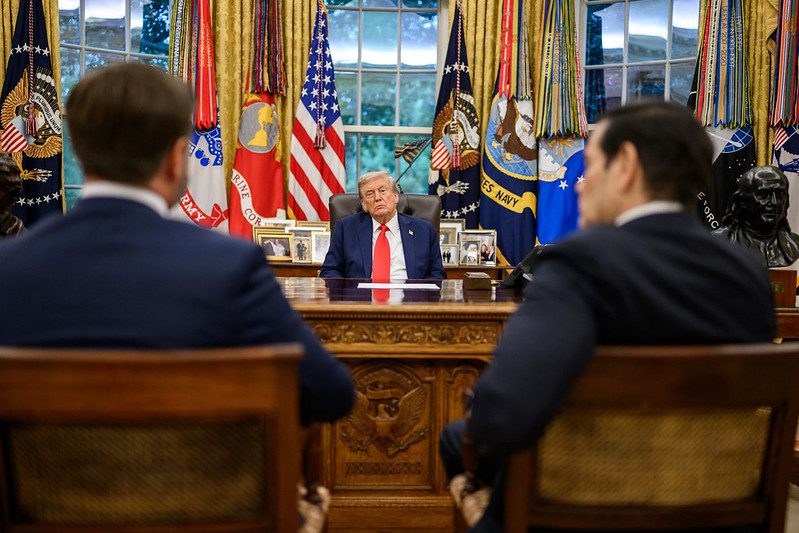In 1989, over 25,000 American troops invaded Panama to depose General Noriega in Operation Just Cause. Noriega, indicted on charges of drug smuggling and racketeering, was detained after US negotiators failed to secure an end to his regime. Now, with the world’s largest aircraft carrier bolstering the greatest build-up of US forces in the Americas since Just Cause, the Trump Administration is signalling its willingness to escalate pressure on Venezuela.
On 2 September, the Trump Administration released a video showing strikes against alleged drug traffickers heading for US shores. Since then, over 17 similar strikes, unilateral military actions, have killed at least 70 people. In October, Trump unusually announced that he had authorised CIA action within Venezuela, stoking expectations that America was poised for regime change. Now, an estimated one-seventh of US naval assets, carrying over 10,000 personnel, including Special Forces, are stationed off allied shores in the Caribbean. In response, Maduro has announced a “massive mobilisation” of his Bolivarian Army and is said to be preparing for guerrilla warfare in case of invasion.
Trump’s justification and motives
The strained relationship between Trump and Maduro has a history of escalation. Tensions flared in March after the Trump Administration clashed with Maduro as part of its deportation campaign. The Trump Administration alleged that 252 of the deported Venezuelans were gang members with connections to the Venezuelan President, who rejected the claims and described the transfers as “kidnapping.” During his first presidency, the US under Trump was one of 60 countries that recognised Maduro’s opponent in the 2018 election, Juan Guaidó, as “president-elect” of Venezuela due to doubts over the validity of the result.
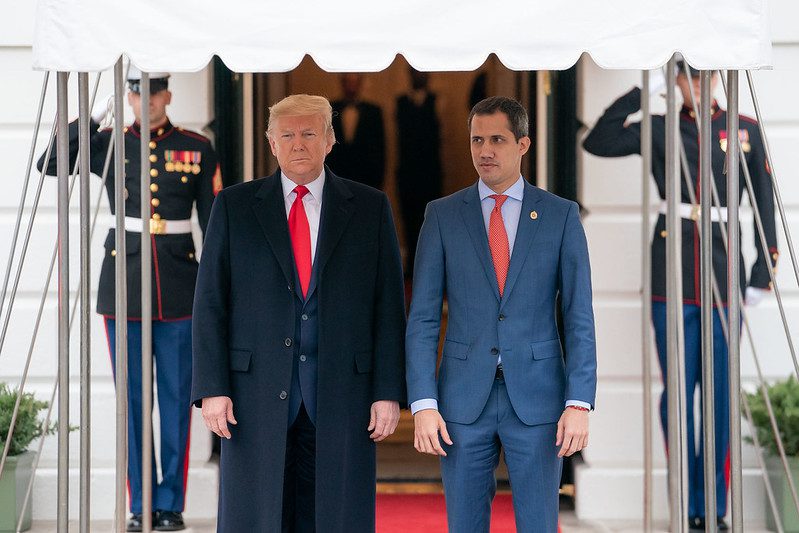
Image: President Trump Visits with the Interim President of the Bolivarian Republic of Venezuela to the White House – Tia Dufour / The White House
Since August, Trump’s rhetoric has intensified. Trump claims Venezuela is a major source of drug traffic to the USA, responsible for the deaths of 300,000 Americans in 2024. He has accused Maduro’s government of complicity, calling it a narco-state. Trump has not only cited reducing drug traffic as a justification, but he has also painted the smuggling groups as threats to national security, alleging links between Maduro and the Salvadorian gang in his crosshairs, Tren de Aragua. The Administration states that the attacks therefore amount to self-defence.
What is new, however, is Trump’s increasing willingness to commit American resources to his aims. With a boldness that has come to characterise his second-term foreign policy, Trump drastically cut the USAID budget in March, reducing it by around 90%. In the same month, he suspended all military aid to Ukraine as part of his isolationist programme sold under the “America First” banner. Yet whether it is providing financial support to Milei’s Argentine government or now accompanying his criticism of Latin American leaders with naval deployments, Trump seems to be temporarily departing from his commitment to keep American budgets in America.
This path carries considerable domestic political risk. Indeed, September’s boat strikes have worsened approval for military action against Venezuela. By 22 October, 27% of Americans were in favour of military attacks on ships around Venezuela, compared to 42% who opposed them, with the remaining 31% unsure. Divisions once again lie along party lines: 68% of Democrats oppose military action (with only 8% supporting it), while 55% of Republicans support it (with 16% opposing it). As Trump’s commitment to reaching a diplomatic end to the war in Ukraine appears to be stalling, American concerns about costly military involvement elsewhere will only be heightened.
Not only this, but Trump has also faced opposition among lawmakers who argue that his actions amount to extrajudicial killings against unlawful targets. Democrats have twice tabled proposals to block military action in Venezuela without Congressional approval. Both failed to pass by narrow margins, with only two Republicans breaking ranks. In fact, these motions were largely symbolic, as they remained subject to presidential veto, requiring broad bipartisan support to overturn. Concerns over the legality of the strikes have drawn international criticism too, with countries including the UK halting the sharing of related intelligence.
In addition, the President is afforded extensive constitutional powers in commanding the military, unless Congress passes specific legislation to prevent military action or restrict budgets (which would still be subject to veto). The 1973 War Powers Resolution, invoked by these motions, was intended to increase congressional influence over military action. The limitations of congressional power were indeed demonstrated in 2019, when the Resolution was invoked to end US support for the Saudi Arabian war in Yemen and was vetoed by the President.
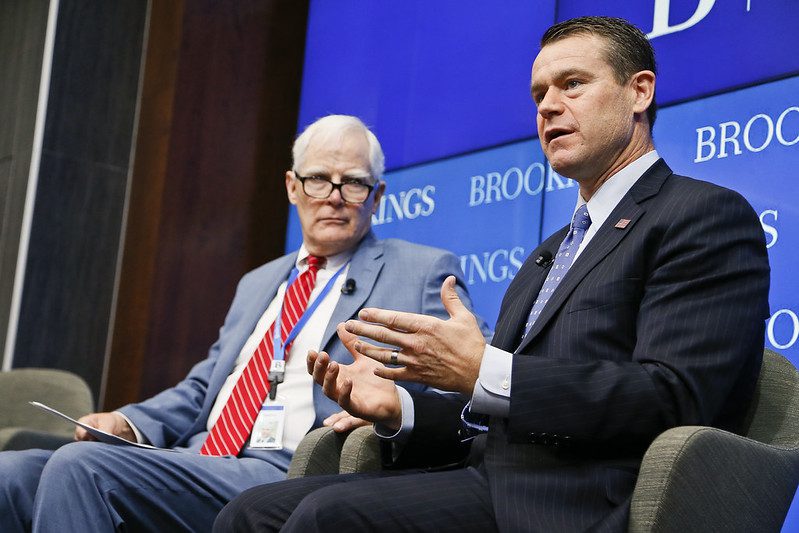
Image: Senator Todd Young at a Brookings Institute Event – Paul Morigi / The Brookings Institute
This is not to say lawmakers on both sides cannot put pressure on the President, who has faced criticism from within his own party. Staunch defenders of America First policies, led by the outspoken Rand Paul, have expressed unease at the scale and cost of the operation. The operating bill of the aircraft carrier USS Gerald R. Ford, en route to the Caribbean, is estimated at over $8 million per day. Senator Todd Young, a Republican who was undecided on the congressional motions, expressed fears that intervention was at odds with American public sentiment. To shore up its footing, the Trump Administration appears to be waiting for a legal justification from the Office of Legal Counsel before taking any further action.
The American audience
Military deployment is intended to send multiple messages to multiple audiences. The first is to Trump’s own domestic voters, to whom he hopes to show he is taking the fight to the dual issues of drug enforcement and migration. His core constituencies have demonstrated broad support for deportations – the primary enforcement vehicle, Immigration and Customs Enforcement (ICE), was viewed favourably by 72% of Republicans in August 2025. On the issue of drugs, Trump has long called for escalated measures, particularly on fentanyl, including death penalties for drug dealers. The Administration has attempted to win support by presenting Venezuela as a crucial roadblock to both its migration and drug policy aims.
Trump found great success among the US Venezuelan population, estimated at over one million, which proved instrumental to victory in Florida. Recognition of Guaidó and staunch opposition to Maduro proved appealing to these voters, many of whom were fleeing the political instability of the current regime. Thus, in targeting Maduro’s government, Trump is likely to find support both at home and among the nearly eight million Venezuelan displaced people (refugees and migrants). However, with his renewed commitment to reducing migration and the recent removal of Temporary Protected Status conferred by the Biden Administration on over 240,000 Venezuelans, the rift may prove insurmountable.
Despite his stated aims, Trump’s actions are unlikely to alleviate either the issue of drug traffic or migration. As is widely acknowledged, Venezuela is not the source of drug traffic his administration claims. In the case of cocaine, while Venezuela does function as a transit route, it is not a major source of the trade, with much larger proportions originating elsewhere, particularly Colombia. Much of this highly mutable network operates through other conduits such as the Dominican Republic, Jamaica, and Puerto Rico. In the case of other major drug networks supplying heroin, methamphetamine, and fentanyl, the bulk of production occurs in Mexico.
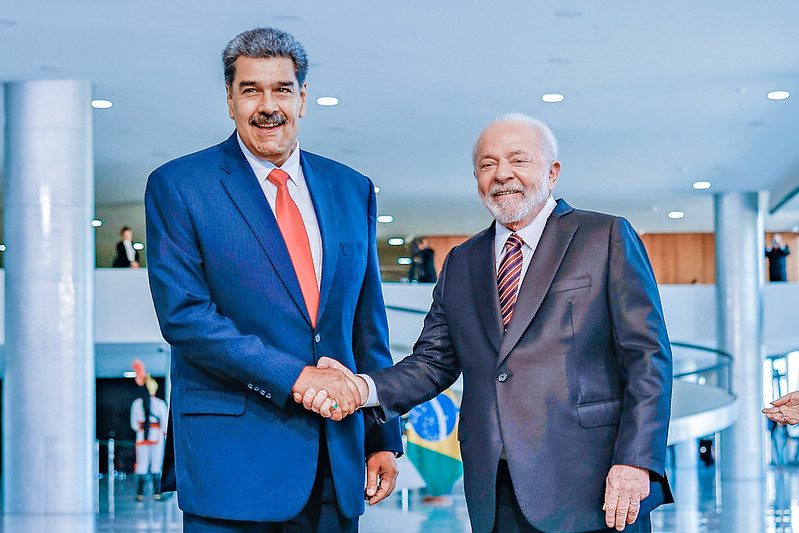
Image: President Maduro meets with President Lula of Brazil – Ricardo Stucket / Palácio do Planalto
Equally, while the end of the Maduro regime would ultimately be cause for cautious optimism regarding human rights, current escalation and punitive measures have already led to new patterns of destabilisation and displacement. Trump’s threats have certainly contributed to domestic uncertainty and hardship in Venezuela. The displaced join the 7.7 million Venezuelan refugees who have left the country since 2014, making it one of the largest international displacement crises.
Other leaders in the region have expressed concerns too, with the Colombian President Gustavo Petro stating that Colombian nationals have been killed in American strikes. Given the ongoing border conflict between Venezuela and Colombia, further destabilisation in Venezuela will have major implications for its neighbour. President Lula of Brazil has also voiced concerns about the instability during his meeting with Trump.
The Venezuelan audience
The second audience is the Maduro regime itself. Even if US officials wish to avoid a highly risky attempt to overthrow the regime, which the American public is likely to see as yet another far-off war, they will certainly be hoping to precipitate this outcome through pressure alone. This excessive and loud build-up, the US anticipates, may be sufficient to scare Maduro into exile or encourage other powerful actors, particularly the military, to remove him as President. Regardless of US officials’ intentions, such brazen aggression could force their hand if sentiment moves away from simple pressure. Having been so transparent in his intentions and characterisation of the threat posed by Venezuela, to not take further action now would entail a very public climbdown for the American President.
The internal dynamics of the Trump Administration certainly influenced the boldness of these actions. Secretary of State Marco Rubio has long pushed for a tougher approach towards Venezuela, mounting pressure on the President since early in his second term. He appears to have gained key allies in this pursuit, including fellow immigration hardliner and Deputy Chief of Staff Stephen Miller. This newfound alliance has been a strong force in shaping the perception of Venezuela as a nation broadly in league with, and entirely pervaded by, drug smuggling gangs: a narco-state. It was Rubio who prompted Trump to recognise Guaidó as the rightful President of Venezuela, and Rubio too who pressed for the revocation of Chevron’s licence to trade in Venezuela, a major pillar of its economy.
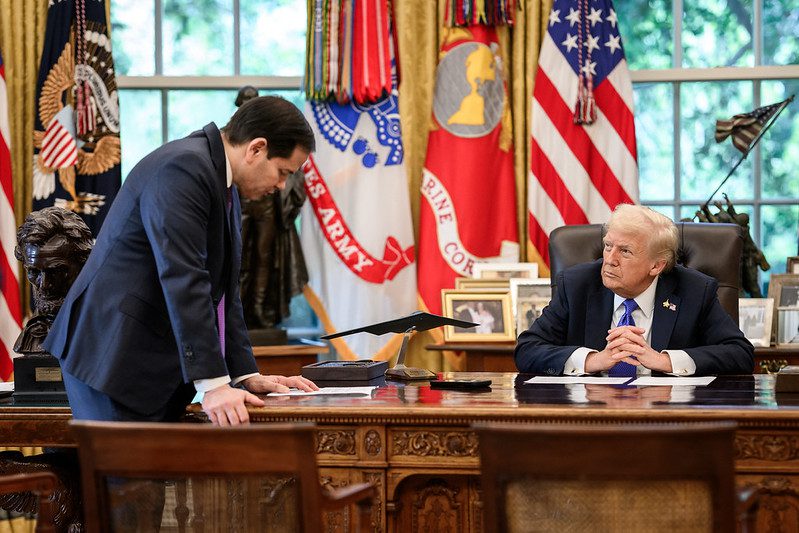
Image: President Donald Trump meets with Secretary of State Marco Rubio – Molly Riley / The White House
Despite Trump’s interest in Venezuelan oil reserves, it is therefore unlikely that extracting commercial concessions is the primary driver of American actions. Indeed, as escalation continued, in October Maduro made several desperate offers of preferential contracts for American oil and mineral extraction, which were rejected. This outcome, in no small part, has been encouraged by the hardline alliance around Trump. Seeing the American position harden, Maduro has redirected these exports to their original partners, most notably China.
The global audience
The third audience for Trump’s messages is America’s global rivals: China and Russia: the same powers now receiving increased shares of Venezuelan exports. Chinese trade with Latin America, having more than tripled in size between 2000 and 2010, has continued to increase rapidly. It has surpassed the US as the region’s primary source of investment. Of particular interest to Trump, the structure of Venezuelan debt to China is guaranteed against crucial future oil exports.
Both Russia and China conduct extensive arms trading with Venezuela, though this has declined recently due to American sanctions. Even so, Russia, the world’s second-largest arms exporter, has overtaken the US as the largest supplier in Latin America. The Russian connection to Venezuela has symbolic significance too: it was through its patronage of Chávez’s early socialist republic that Russia re-established its prior Cold War foothold in the region.
Also bound by their shared interests as major oil exporters, Putin’s aides have reiterated their commitment to supplying Venezuela with weaponry, including Oreshnik and Kalibr hypersonic missiles, during this American escalation. In contrast to Trump, Putin has maintained close relations with Maduro, being one of the world leaders to recognise him as the Venezuelan President.
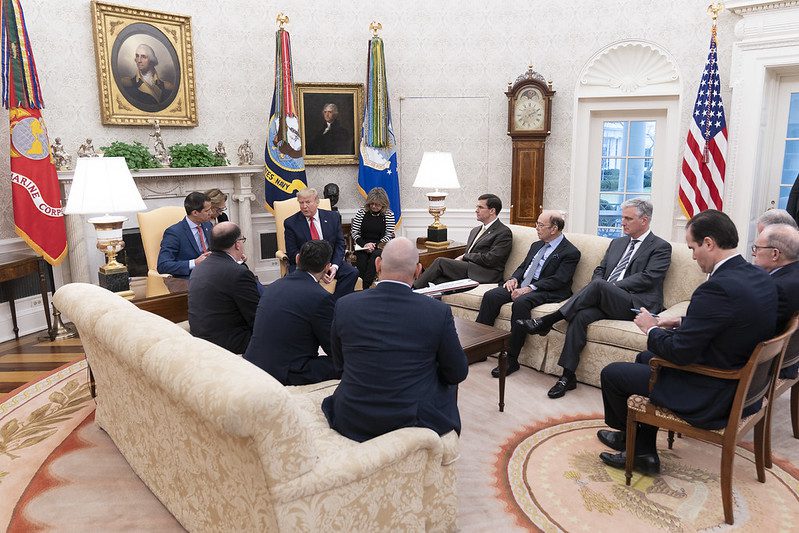
Image: President Trump Visits with the Interim President of the Bolivarian Republic of Venezuela to the White House – Shealah Craighead / The White House
Since its inception in 1823, the Monroe Doctrine has informed American leadership’s view of Latin America as its sphere of influence. The growing presence of countries hostile to America, particularly in a nation of such strategic significance as Venezuela, is increasingly threatening. Trump’s military response to this threat is intended for multiple audiences. Domestically, he may well gain from presenting himself as tough on the issues of drug enforcement and migration, which he attempts to combine in the Venezuelan case. This does not come without the major risk of disappointing the many Americans who have bought into America First policy and Trump as the President to carry it out.
Despite this, he is certainly encouraged down this path by pressure from senior figures within his Administration who have long wished for tougher treatment of Maduro’s government. This build-up is thus directed at the Maduro regime itself, to signal American willingness to take decisive action and potentially achieve regime change without entering land conflict, and, perhaps most importantly, at those global powers that have gained increasing influence in Latin America: powers Trump wishes to ward off through a show of strength.
Featured Image via The White House – Daniel Torok

